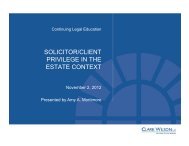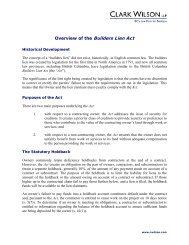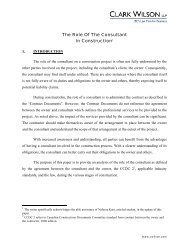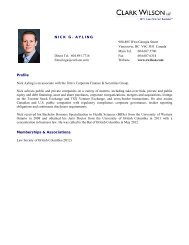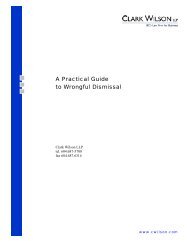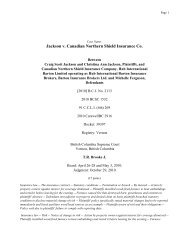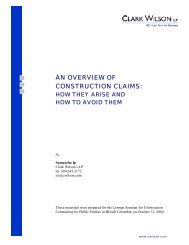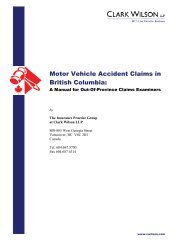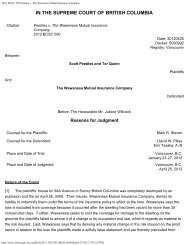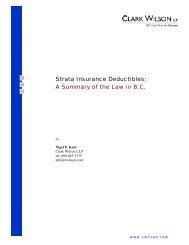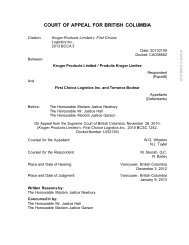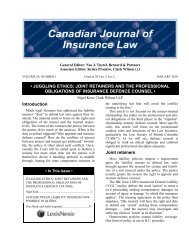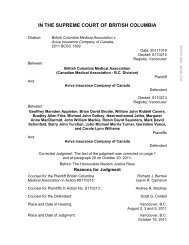juggling ethics: joint retainers and the ... - Clark Wilson LLP
juggling ethics: joint retainers and the ... - Clark Wilson LLP
juggling ethics: joint retainers and the ... - Clark Wilson LLP
You also want an ePaper? Increase the reach of your titles
YUMPU automatically turns print PDFs into web optimized ePapers that Google loves.
p. 12<br />
“insured” may wish to settle. Essentially, by taking up <strong>the</strong> policy of insurance, <strong>the</strong> insured has<br />
agreed that, subject to “good faith” remedies, his interest (at least in non‐financial terms) <strong>and</strong><br />
his wishes will be subordinated to those of <strong>the</strong> insurer in relation for <strong>the</strong> latter’s obligation to<br />
indemnity him for damages arising from <strong>the</strong> final award or settlement made against him. This<br />
reality would appear to have been accepted by <strong>the</strong> defendants in this case, none of whom have<br />
objected to ICBC’s appointment of one counsel to defend <strong>the</strong> four actions.” (emphasis added)<br />
The Court of Appeal <strong>the</strong>n examined <strong>the</strong> jurisdiction to remove counsel from a case where <strong>the</strong><br />
administration of justice is threatened. Here, both <strong>the</strong> Court <strong>and</strong> <strong>the</strong> Law Society in its submissions<br />
acknowledged that <strong>the</strong>re may be a concern about one counsel <strong>joint</strong>ly representing parties with<br />
divergent interests, namely, that “counsel might act with divided loyalties <strong>and</strong> <strong>the</strong>refore fail to exercise<br />
full diligence in protecting each client’s interest.” However, it was not appropriate for <strong>the</strong> Court to<br />
“inquire into <strong>the</strong> private arrangements among <strong>joint</strong>ly represented parties to determine whe<strong>the</strong>r counsel<br />
has met <strong>the</strong> applicable professional st<strong>and</strong>ards” in as much such inquiry may impinge upon matters<br />
properly <strong>the</strong> subject of solicitor‐client privilege. Ra<strong>the</strong>r, “it is, after all, <strong>the</strong> Law Society ra<strong>the</strong>r than <strong>the</strong><br />
Court, that has primary responsibility for <strong>the</strong> regulation <strong>and</strong> supervision of <strong>the</strong> professional conduct of<br />
lawyers”.<br />
Mara v. Blake is a fascinating example of a <strong>joint</strong> retainer of defence counsel notwithst<strong>and</strong>ing clear <strong>and</strong><br />
obvious conflicts of interest between <strong>the</strong> clients going to fundamental issues in <strong>the</strong> litigation. Equally<br />
fascinating is how <strong>the</strong> very Law Society charged with policing professional conduct code compliance<br />
effectively argued in support of <strong>the</strong> <strong>joint</strong> retainer even though it appeared to run afoul of <strong>the</strong> Court’s<br />
“undivided loyalty” principle m<strong>and</strong>ated by Chapter 6 of <strong>the</strong> Professional Conduct H<strong>and</strong>book.<br />
In Mara v. Blake <strong>the</strong> Court commented on <strong>the</strong> “reality” of <strong>the</strong> insurers contractual right to control <strong>the</strong><br />
defence noting that such reality “appears to have been accepted by <strong>the</strong> defendants, none of whom have<br />
objected to ICBC’s appointment of one counsel to defend <strong>the</strong> four actions.” This commentary begs<br />
several questions: were <strong>the</strong> insureds even asked? Were <strong>the</strong> insureds issued a Chapter 6 letter<br />
m<strong>and</strong>ated by <strong>the</strong> Professional Conduct H<strong>and</strong>book? Did <strong>the</strong> Law Society make those inquiries even<br />
though <strong>the</strong> Court chose not to? The answer to all <strong>the</strong>se questions is “probably not”.<br />
Mara v. Blake emphasized <strong>the</strong> insurers contractual right to appoint/instruct counsel <strong>and</strong> conduct <strong>the</strong><br />
defence of <strong>the</strong> litigation, but in its October 2008 Bencher’s Bulletin 20 <strong>the</strong> Law Society of B.C. has seen fit<br />
to remind <strong>the</strong> profession:<br />
“So long as <strong>the</strong> insured is a client, <strong>the</strong> Rules of Professional Conduct‐<strong>and</strong> not <strong>the</strong> insurance<br />
contract‐govern <strong>the</strong> lawyer’s obligations to <strong>the</strong> insured”.<br />
Whe<strong>the</strong>r this means <strong>the</strong> Law Society will now be more diligent in actively policing Professional Conduct<br />
H<strong>and</strong>book compliance by <strong>the</strong> Insurance Bar remains to be seen.<br />
THE REAL WORLD: PRACTICAL SOLUTIONS OR ETHICAL COMPROMISE?<br />
Insurance defence counsel are confronting a delicate task. They have spent much time <strong>and</strong> effort<br />
cultivating long term client relationships with <strong>the</strong> insurers who send <strong>the</strong>m work. Those insurers will not<br />
20 Appendix 5<br />
© 2009 <strong>Clark</strong> <strong>Wilson</strong> <strong>LLP</strong> cwilson.com<br />
Nigel P. Kent, T. 604.643‐3135.



